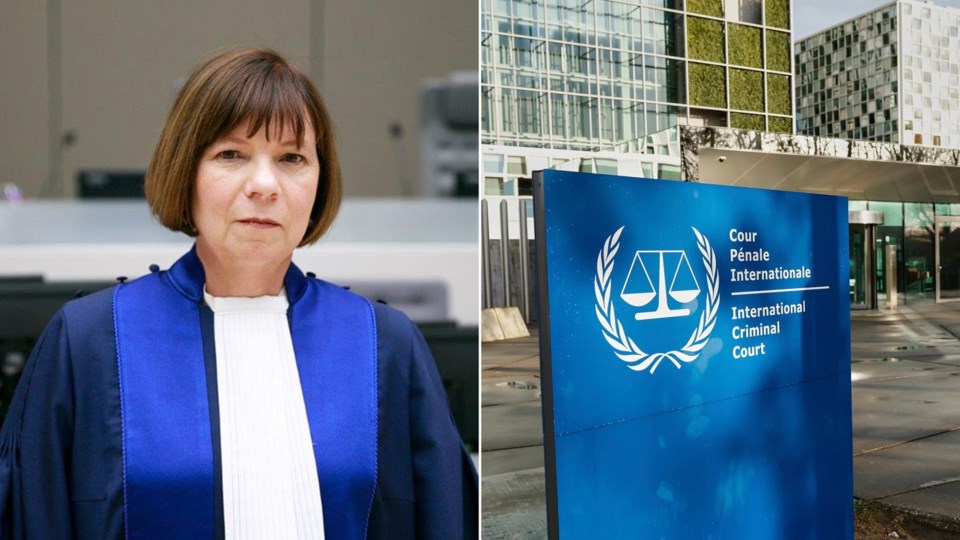OTTAWA — Advocates for international law say Ottawa is letting Washington chip away at the global rules-based order by remaining silent a week into American sanctions against a Canadian jurist.
On Aug. 20, the administration of U.S. President Donald Trump slapped sanctions on Kimberly Prost, a judge on the International Criminal Court who authorized a probe into U.S. personnel in Afghanistan.
Prost, a Canadian citizen who was raised in Winnipeg, will have any U.S. assets frozen, and she could have difficulty accessing financial services in Canada.
The U.S. State Department also sanctioned citizens of France, Fiji and Senegal over their role in the ICC's investigation of Israel's actions in Gaza and the West Bank.
The French government said it was "appalled" by the move and called it an attack on the court and all its members that runs contrary to the principle of the independence of the judicial system."
Ottawa has said nothing publicly about the move to date.
Foreign Affairs Minister Anita Anand's spokeswoman Myah Tomasi said Thursday that Anand had raised concerns about Prost's sanctioning in her meeting on Aug. 21 with U.S. Secretary of State Marco Rubio. That meeting came the day after he announced the sanctions.
Advocates say Canada is compromising its legacy of helping found the ICC, in order to placate Trump.
"This is about whether or not we believe that opposing sanctions against people who are trying to hold war criminals to account is something that we do, or whether we remain silent and do nothing," said Mark Kersten, a University of the Fraser Valley professor who specializes in the ICC.
When Washington announced the sanctions, it alleged the ICC is a "a national security threat that has been an instrument for lawfare against the United States and our close ally Israel."
Neither country is a member of the international court.
Kersten said the move was "no surprise whatsoever," since those close to Trump threatened ICC judges in November 2024 and he signed an executive order targeting the international tribunal in February.
He said the prospect of Trump issuing sanctions "dominated our conversations" last December during the court's major conference in The Hague, which was attended by staff from Global Affairs Canada.
Kersten said Prost could face challenges working with Canadian banks and airlines, who might be reluctant to provide services to someone under American sanctions given most do business in the U.S.
He said Ottawa should issue a blocking statute under the Foreign Extraterritorial Measures Act, which bars Canadian businesses from enforcing what the Department of Justice refers to as "unacceptable extraterritorial assertions of foreign jurisdiction" and allows lawsuits against those who co-operate with unjust foreign sanctions.
Ottawa used the law in the 1990s to prevent American sanctions on Cuba from hurting Canadian corporations, and the European Union undertook a very similar process.
"That's actually a critical step in what needs to happen if Canada can't actually just get the sanctions removed from her," Kersten said.
Former foreign affairs minister Lloyd Axworthy said the Carney government is "abandoning" the world court it helped found, and showing conditional support for the rules-based order it constantly talks about.
Axworthy said it's clear Canada is trying to appease Trump in trade talks instead of defending international law as Washington tries to coerce and intimidate multilateral institutions.
The former Liberal cabinet minister tabled the legislation that in 2000 made Canada the first country to implement the ICC's founding treaty into domestic law. He said Canada risks going from being "architects and stewards" for the rules-based international order to "some kind of mercantilism" if it doesn't stand up for core principles.
"We have a government that has received a very strong mandate from Canadians, and I think it should use it not just in negotiating with Washington, it should be able to broaden its reach and make sure that the other institutions that are important to Canadians are retained," he said.
"Doing a pass-by on somebody who is attacking one of your own judges on an international institution (when) you know that that has an injurious effect — I'm not sure (whether) staying quiet was just simply an omission or was it deliberate," he said.
Axworthy noted that the issue didn't appear in official readouts following Anand's meeting with Rubio.
He said Ottawa's silence tells Canadian officials they won't be defended if they take up politically sensitive work, which erodes morale and Canada’s global standing.
He said Canada should work with other countries to "re-energize support for some of these institutions that are still in existence, but tottering from those kinds of attacks," including institutions Washington is defunded or attacking that focus on justice, climate change and development.
"I don't think we're putting our diplomatic assets to work, on the protection of the institutions that themselves protect people," Axworthy said.
Kersten said when the first Trump administration sanctioned two senior ICC officials from Africa in 2020, Canada issued a public statement saying that generally, ICC staff should not be sanctioned.
Kersten said the lack of Canada saying anything after one of its own citizens was sanctioned is "a foreign-policy failure."
"It seems to me to be … upholding our principles and openly protecting our citizens from egregious sanctions is worth sacrificing at the altar of appeasing Donald Trump, at a time when we're negotiating with him," Kersten said.
"If we don't do anything about this now, it won't just be the ICC. We will normalize the use of coercive sanctions, not only against our citizens, but against people who have done exactly nothing wrong and who have dedicated their lives to serve others."
This report by The Canadian Press was first published Aug. 28, 2025.
Dylan Robertson, The Canadian Press



